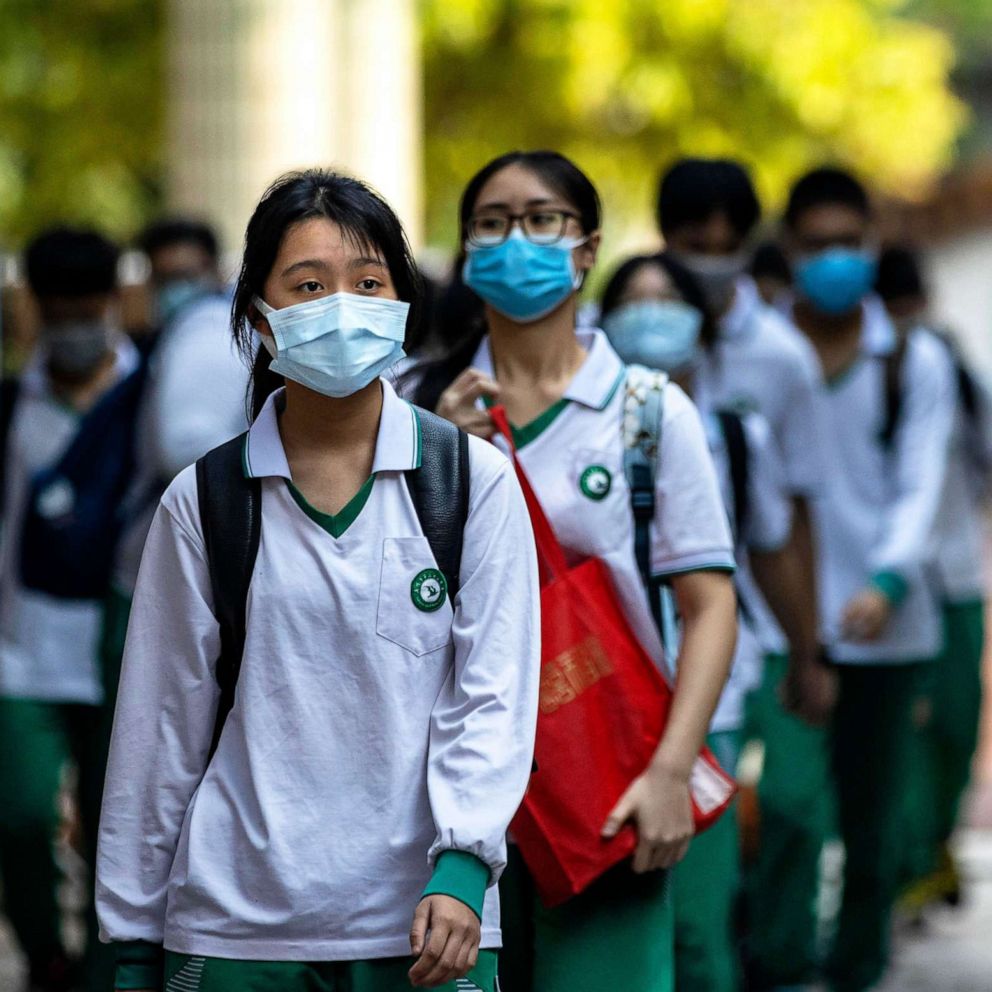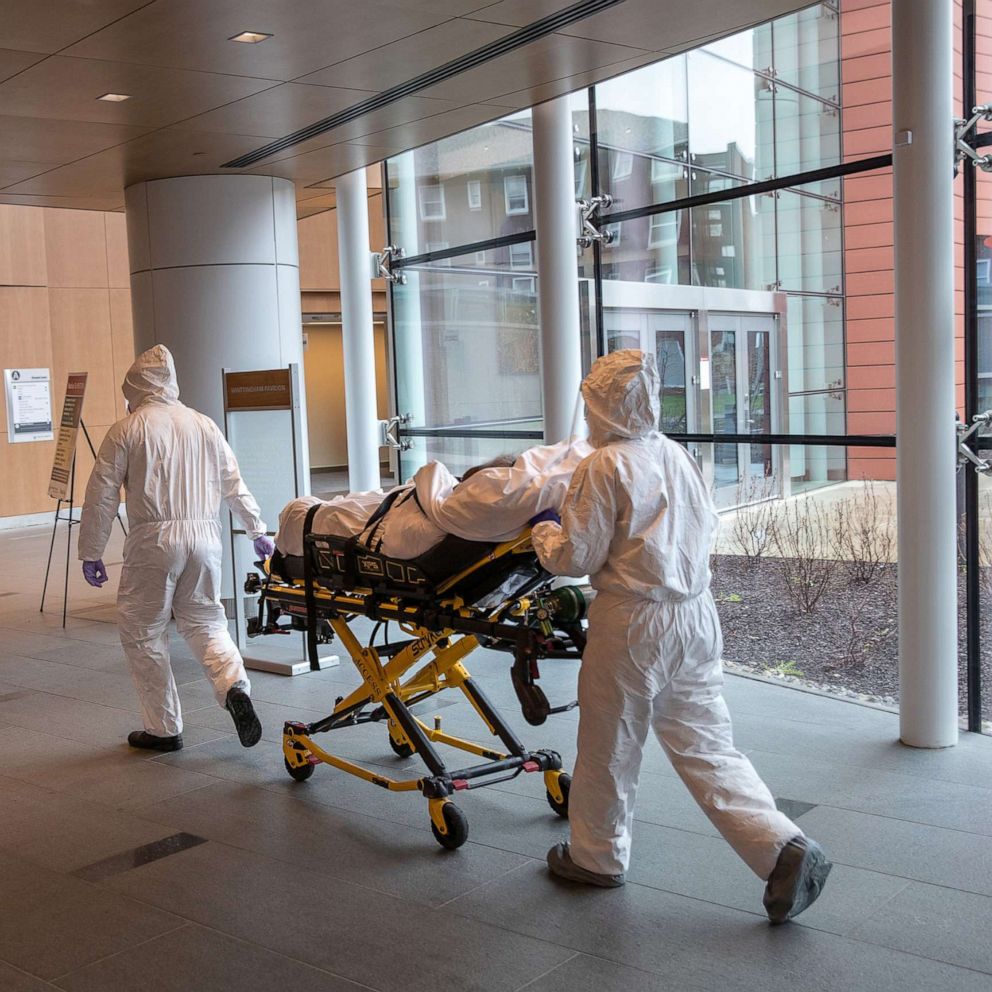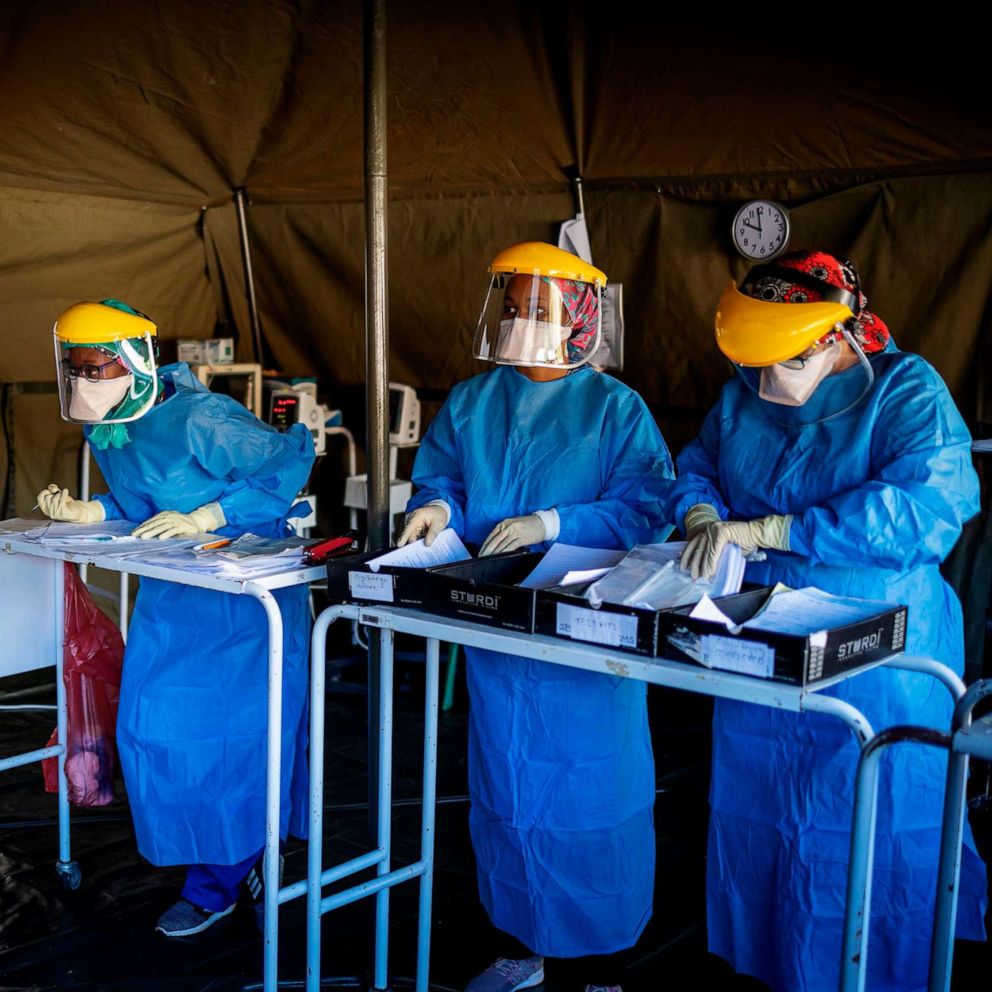Citing concerns about China, Trump threatens to reconsider membership in WHO
The president outlined his concerns in a four-page letter to WHO officials.
A pandemic of the novel coronavirus has now killed more than 317,000 people worldwide.
More than 4.7 million people across the globe have been diagnosed with COVID-19, the disease caused by the new respiratory virus, according to data compiled by the Center for Systems Science and Engineering at Johns Hopkins University. The actual numbers are believed to be much higher due to testing shortages, many unreported cases and suspicions that some governments are hiding the scope of their nations' outbreaks.
Since the first cases were detected in China in December, the United States has become the worst-affected country, with more than 1.5 million diagnosed cases and at least 90,193 deaths.
Monday's biggest developments:
Here's how the news developed Monday. All times Eastern.
12:42 a.m.: Trump threatens to reconsider US membership in WHO
Citing his concerns about the World Health Organization's lack of independence from China, President Donald Trump released a four-page letter to the WHO's director-general that says the United States may consider pulling out of the organization.
The letter, posted to Twitter, accuses the WHO of repeatedly making misleading claims about the COVID-19 virus and of failing to press China for a timely response to the growing pandemic. It comes a month after the president suspended U.S. contributions to the WHO, pending an investigation by his administration.
"This review has confirmed many of the serious concerns I raised last month and identified others that the World Health Organization should have addressed, especially the World Health Organization's alarming lack of independence from the People's Republic of China," the letter said.
"If the World Health Organization doesn't commit to major substantive improvements within the next 30 days, I will make my temporary freeze of United States funding to the World Health Organization permanent and reconsider our membership in the organization," said the letter.
7:55 p.m.: 4 million stimulus payments to be delivered via debit card
Nearly 4 million economic impact payments will be sent by prepaid debit card, the Treasury Department announced.
Starting this week the cards will be mailed in place of paper checks to people whose most recent tax return was processed by either the Andover or Austin IRS Service Center, but who don't have bank information on file with the IRS. The cards can be used to make purchases, withdraw cash or transfer funds.
Since mid-April, the Treasury Department has so far delivered stimulus payments totaling $239 billion to Americans via direct deposit, Direct Express card accounts, or check.
The funds are part of a $2.2 trillion coronavirus stimulus relief package.
5:42 p.m.: US death toll climbs past 90,000
The United States death toll from COVID-19 has surpassed 90,000.
According to data compiled by the Center for Systems Science and Engineering at Johns Hopkins University, 90,193 people have died from the virus in the U.S.
Earlier this month, President Donald Trump again revised his estimate of how many Americans will die from the coronavirus, saying it could be as many as 100,000.
3:30 p.m.: Texas' professional sports can resume at end of May
Texas is ready to move into "phase two" of reopening businesses, Gov. Greg Abbott announced Monday.
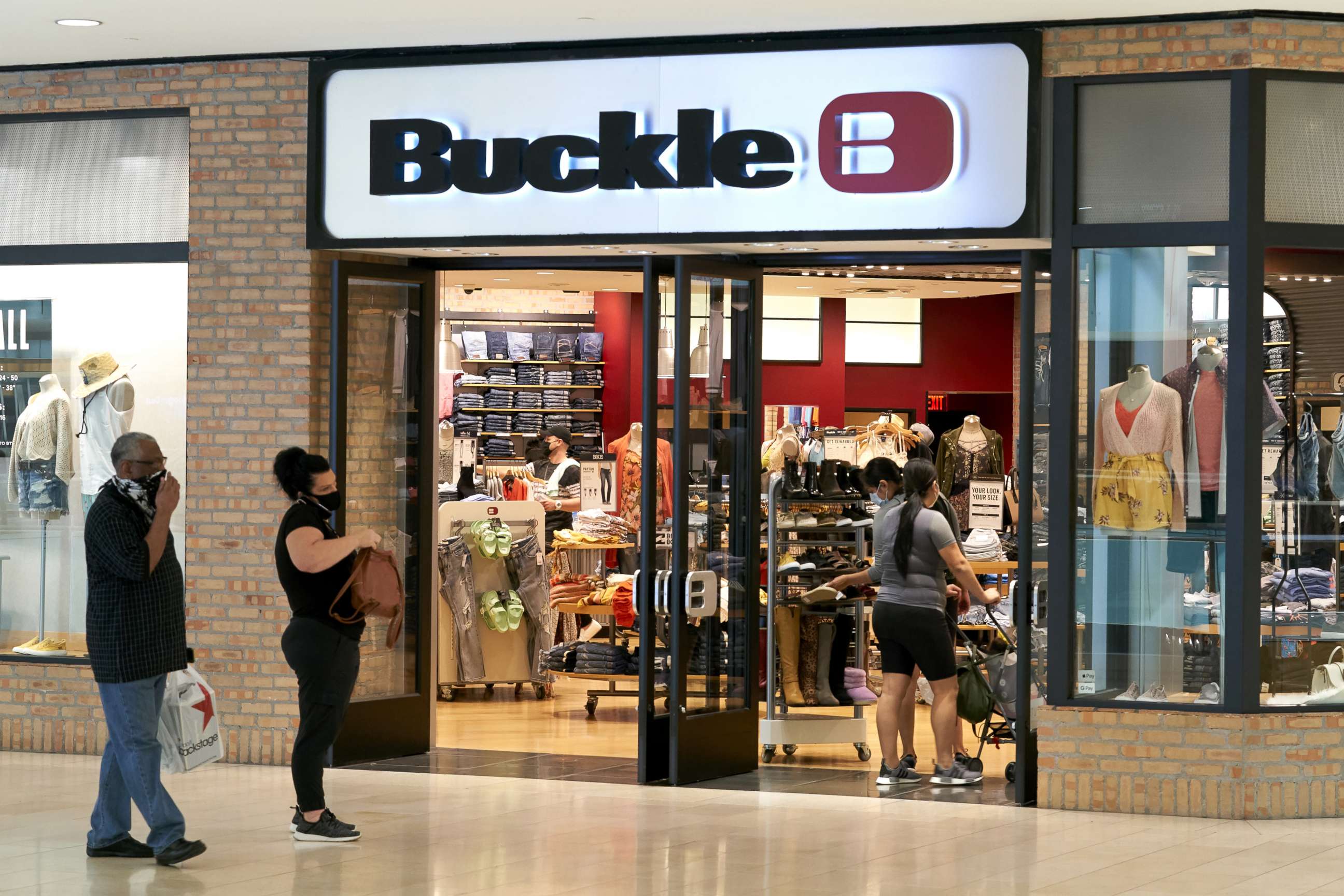
Immediately, child care services can reopen.
Barber shops, hair salons and gyms have already been open, and now other personal service businesses can resume, Abbott said.
Beginning May 22, Abbott said a long list of businesses can reopen or expand capacity, including: restaurants can open to a 50% capacity, while bars and bowling allies can open to 25% capacity.
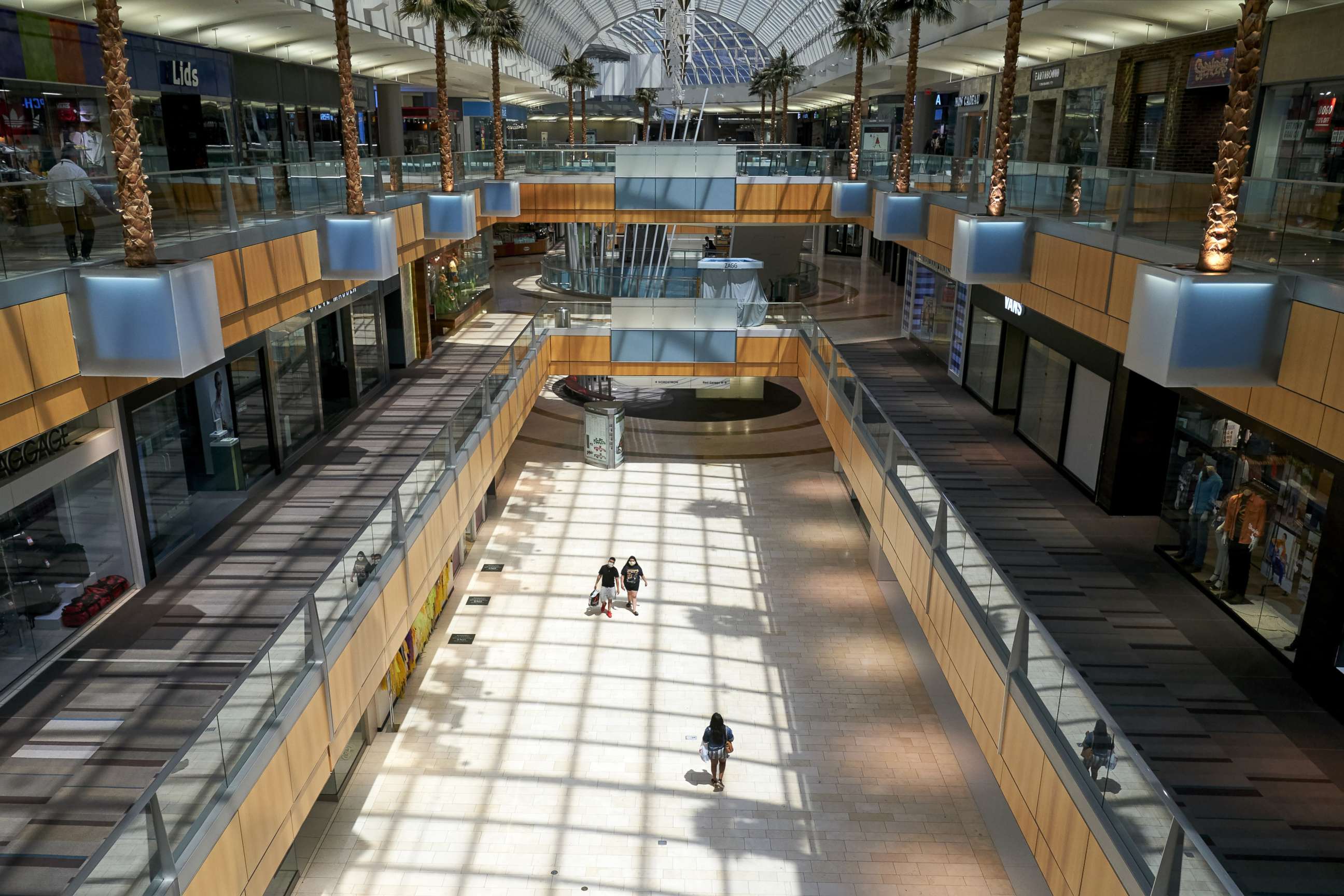
On May 31, professional sports can resume, including golf, auto racing, football and basketball, the governor said.
Also on May 31, youth sports camps, day camps and overnight camps can return, he said.
Texas now has 1,512 coronavirus patients in hospitals -- its lowest hospitalization number since April 21, Abbott said.
Tune into ABC at 1 p.m. ET and ABC News Live at 4 p.m. ET every weekday for special coverage of the novel coronavirus with the full ABC News team, including the latest news, context and analysis.
3:10 p.m.: Virginia Beach allowed to reopen its beaches on Friday
Virginia Beach can reopen its public beaches this Friday, Gov. Ralph Northam said on Monday.
The new order will allow sunbathing, swimming and fishing.
The governor's previous order only allowed beaches to be used for exercise.
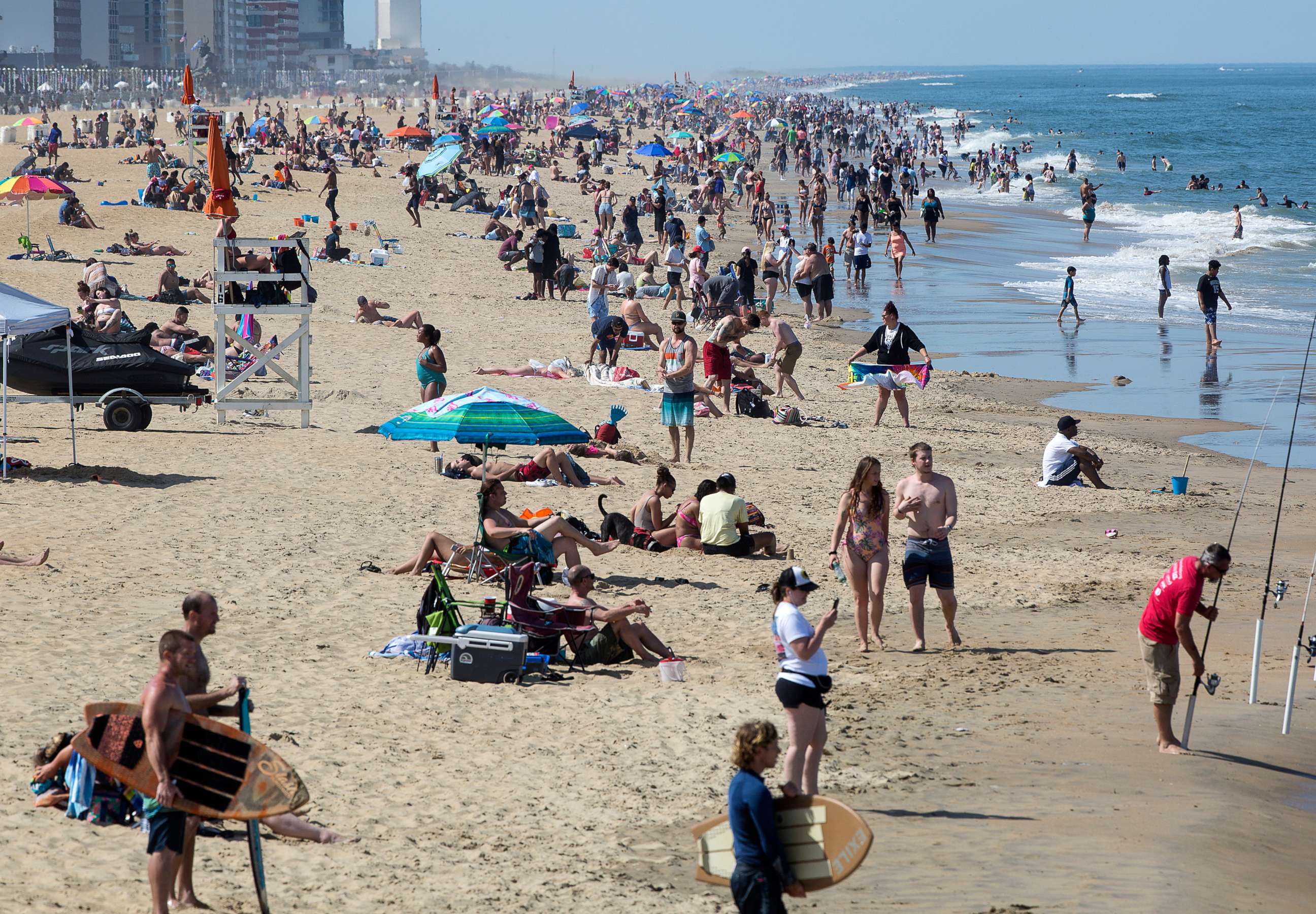
But there will be some restrictions: no alcohol, large gatherings or team sports. Northam warned that if rules are not followed, and if social distancing is ignored, he will reinstate restrictions or close the beaches.
1:28 p.m.: New Jersey's governor outlines the road toward reopening
While New Jersey is "not nearly out of the woods yet," in the last two weeks the number of patients in ICUs and the number of patients in hospitals have both fallen by 36%, Gov. Phil Murphy said Monday.
As of this Friday, more outdoor businesses can restart in New Jersey including batting cages, golf ranges and private tennis clubs, Murphy said.
The governor on Monday outlined how to reach the "new normal."
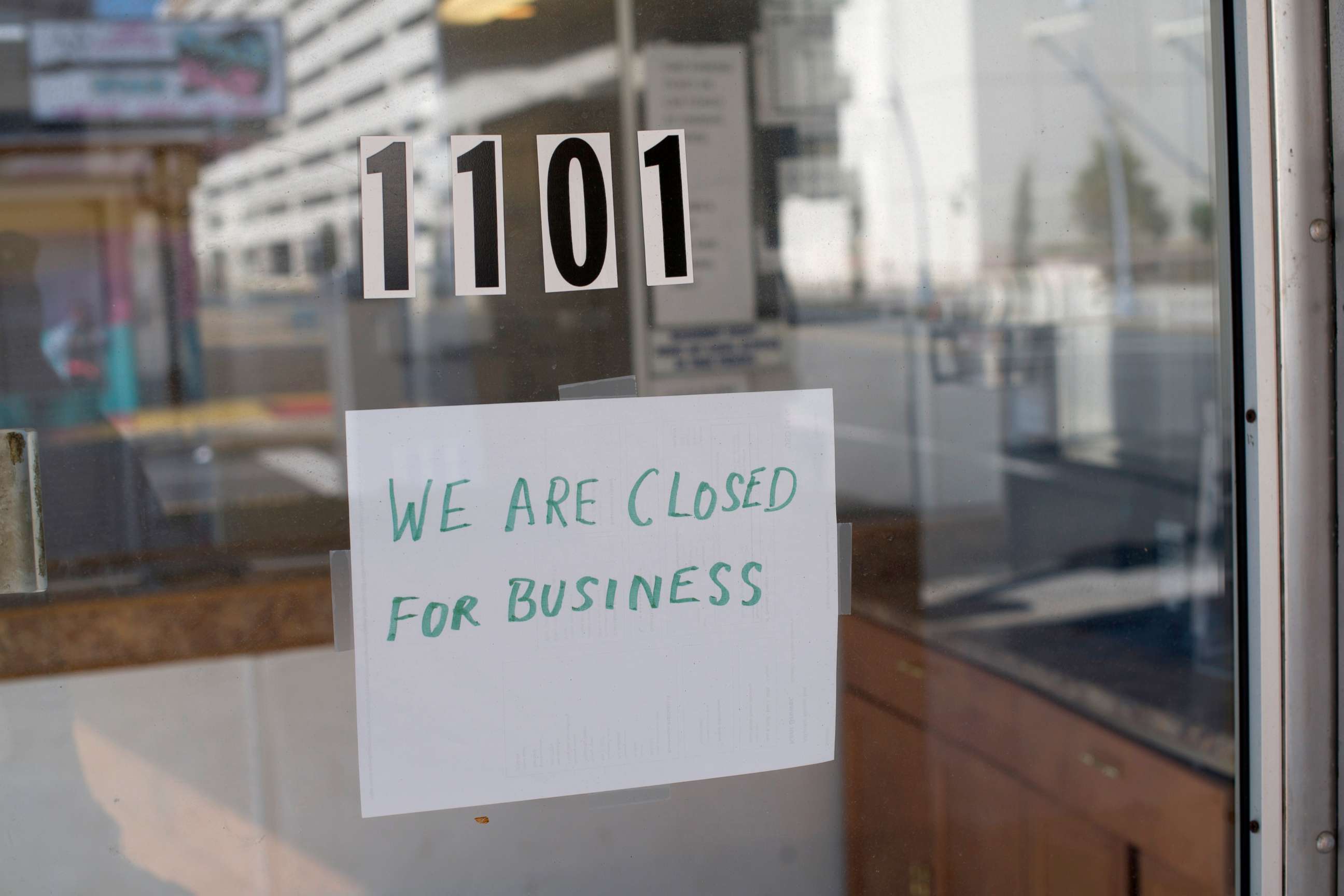
He explained safeguards for different work environments, from those who have frequent contact with co-workers and customers -- like bartenders and restaurant workers -- to those who can continue to work from home.
Murphy also unveiled the stages for opening different businesses, according to risk.
The state is currently in stage one, which includes access to parks, beaches and curbside retail.
Then will come expanded retail, outdoor dining, indoor dining at significantly reduced capacity, and limited personal care.
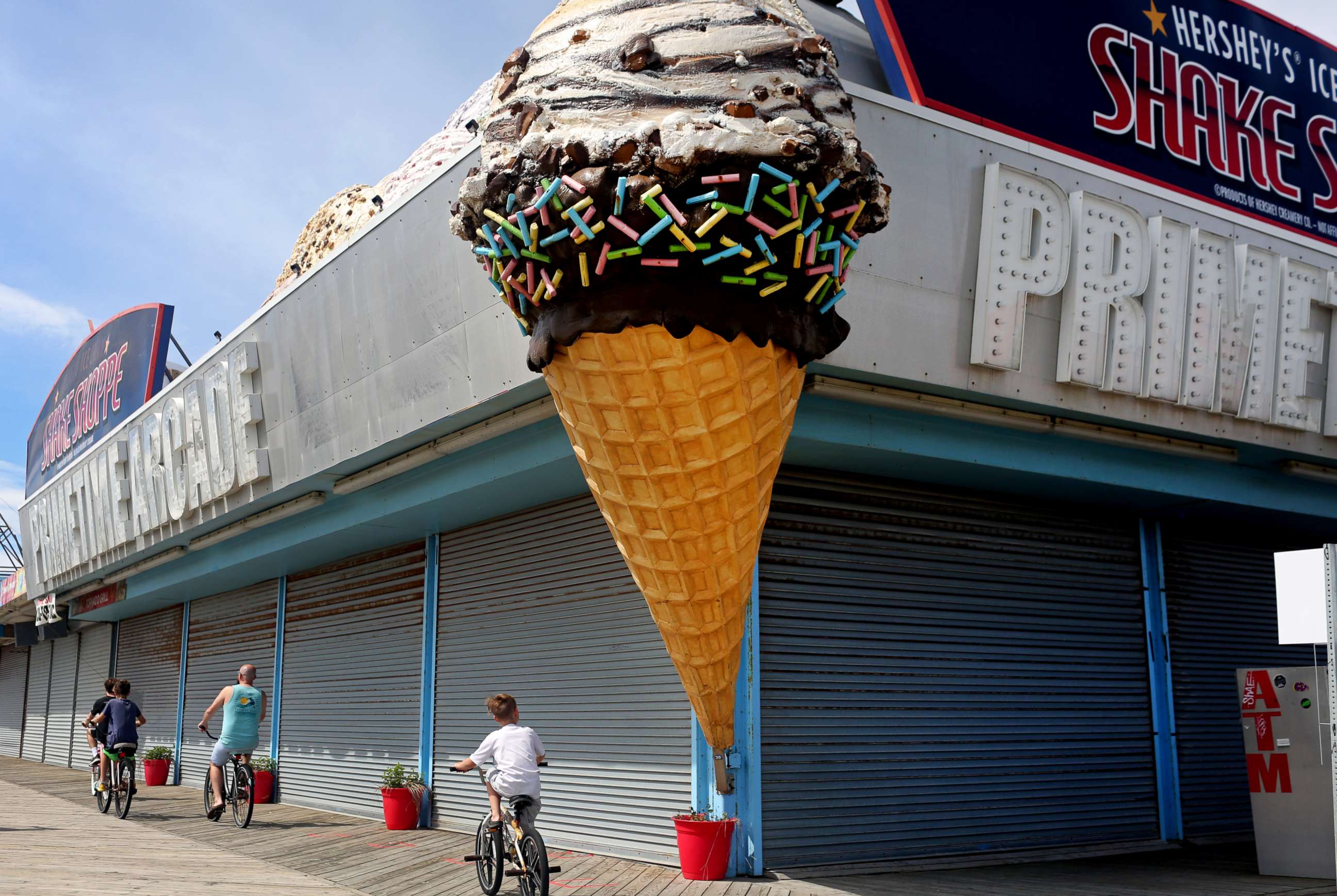
The third stage will include expanded dining, critical in-office work, expanded personal care services, and bars with limited capacity.
The state has reported more than 148,000 diagnosed cases and over 10,000 confirmed deaths.
12:42 p.m.: Massachusetts unveils plan for gradual reopening
Massachusetts Gov. Charlie Baker on Monday unveiled the state's plan for a gradual reopening, with the first phase beginning now.
Retail can now operate with curbside pickup and places of worship can reopen with a 40% occupancy limit.
Next Monday, May 25 -- Memorial Day -- hair salons and barber shops can open for appointment-only service.
Beaches can also reopen then, as well as parks, drive-in theaters and some athletic fields and courts.
Offices can reopen with a 25% maximum occupancy, though working from home is still strongly encouraged.
In Boston, the office opening is delayed until June 1.
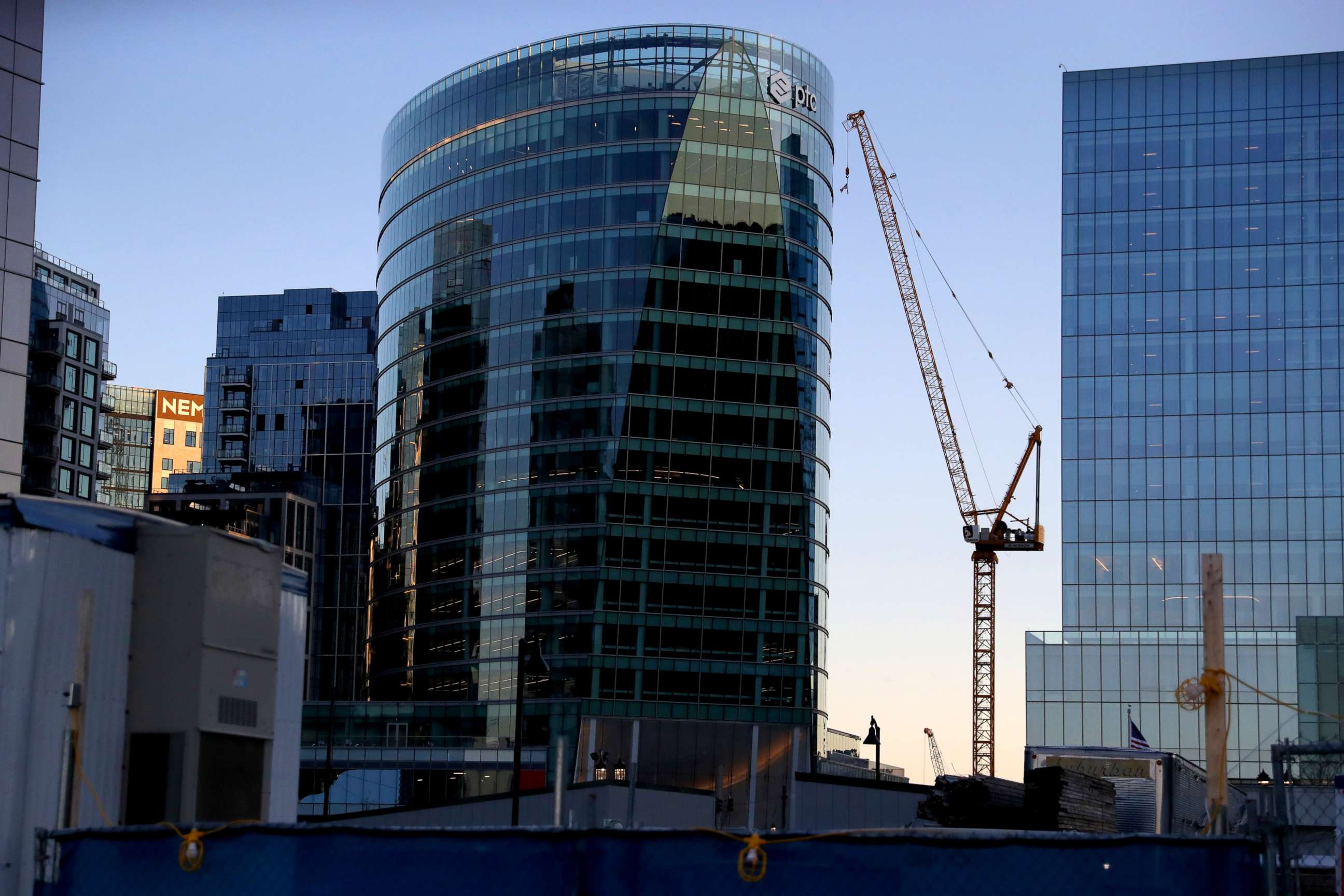
Future phases will include the reopening of restaurants and bars, the governor said.
12:05 p.m.: Cuomo encourages major sports teams to plan to reopen without fans
In New York state, 106 people lost their lives to the coronavirus on Sunday, including 23 people who died in nursing homes, Gov. Andrew Cuomo said Monday.
Protecting nursing home residents and other senior citizens are a major priority for the state, Cuomo said. Last week, New York started requiring nursing home staff to be tested twice per week, Cuomo said. The state is sending 320,000 test kits to nursing homes.
So far, five of New York's upstate regions have reopened. Western New York is preparing to reopen in "Phase 1" on Tuesday.
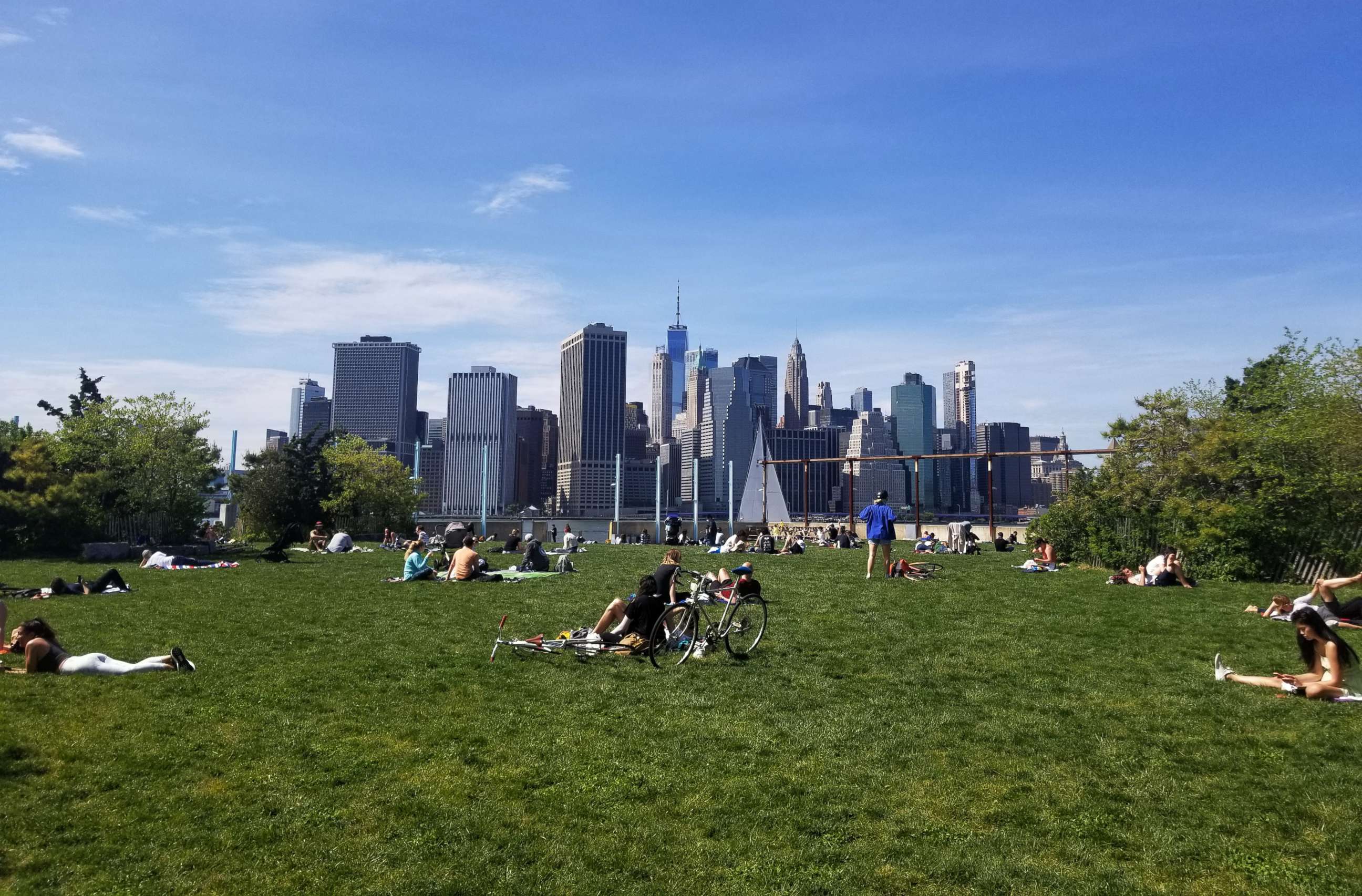
Cuomo said he encourages major sports teams to plan to reopen without fans, with games still broadcast on TV.
"If they can economically have games with no fans ... the state will work with them to come back," Cuomo said. "Why wait until you can fill a stadium before you start to bring the team back?"
11 a.m.: Air travel on the rise
After the start of the pandemic sent travel plunging, U.S. airports are seeing an uptick in passengers.
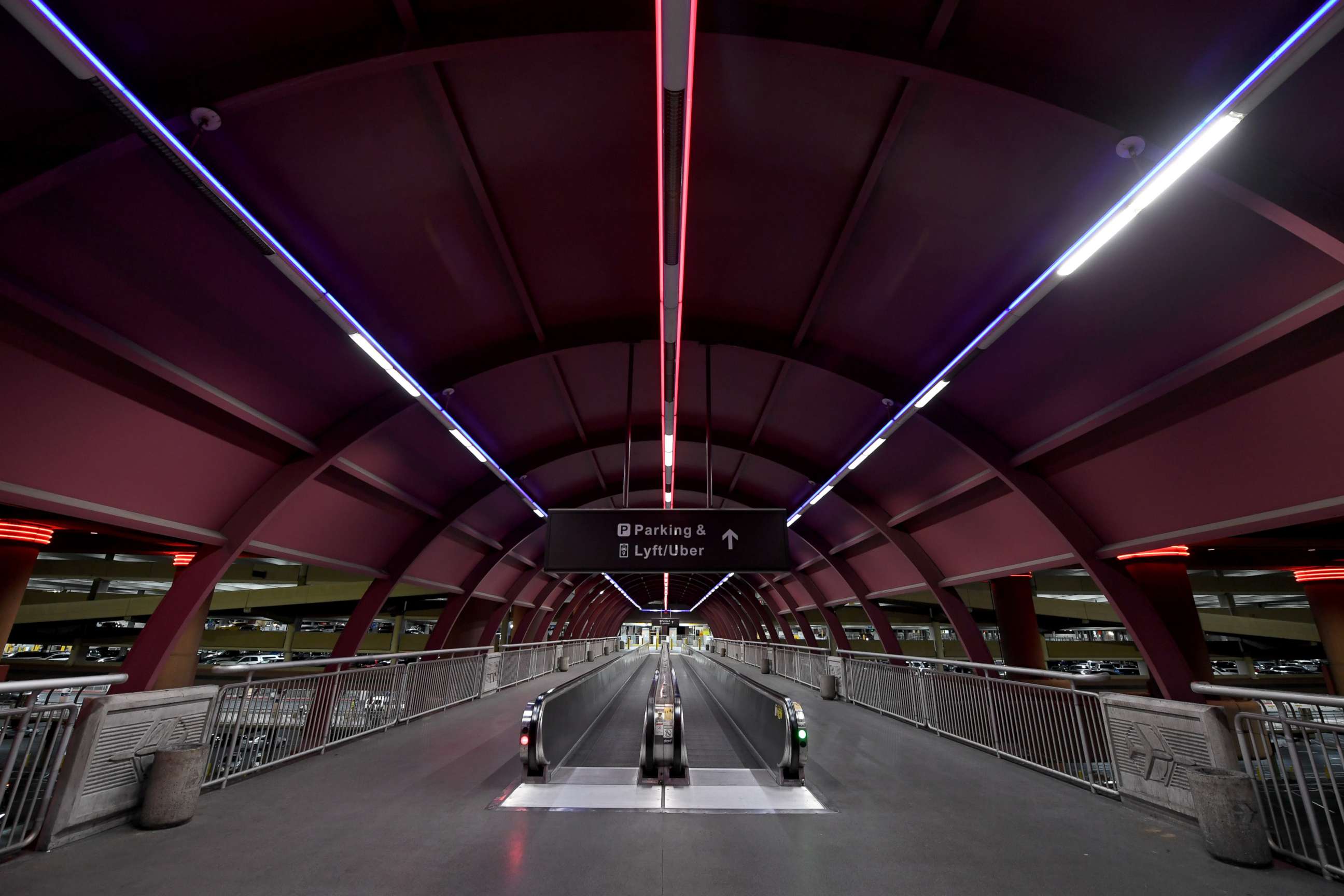
On Sunday, agents with the Transportation Security Administration (TSA) screened 253,807 travelers -- the highest number of daily passengers since March 24.
At the same time last year, TSA checkpoints across the U.S. recorded 2,620,276 travelers.
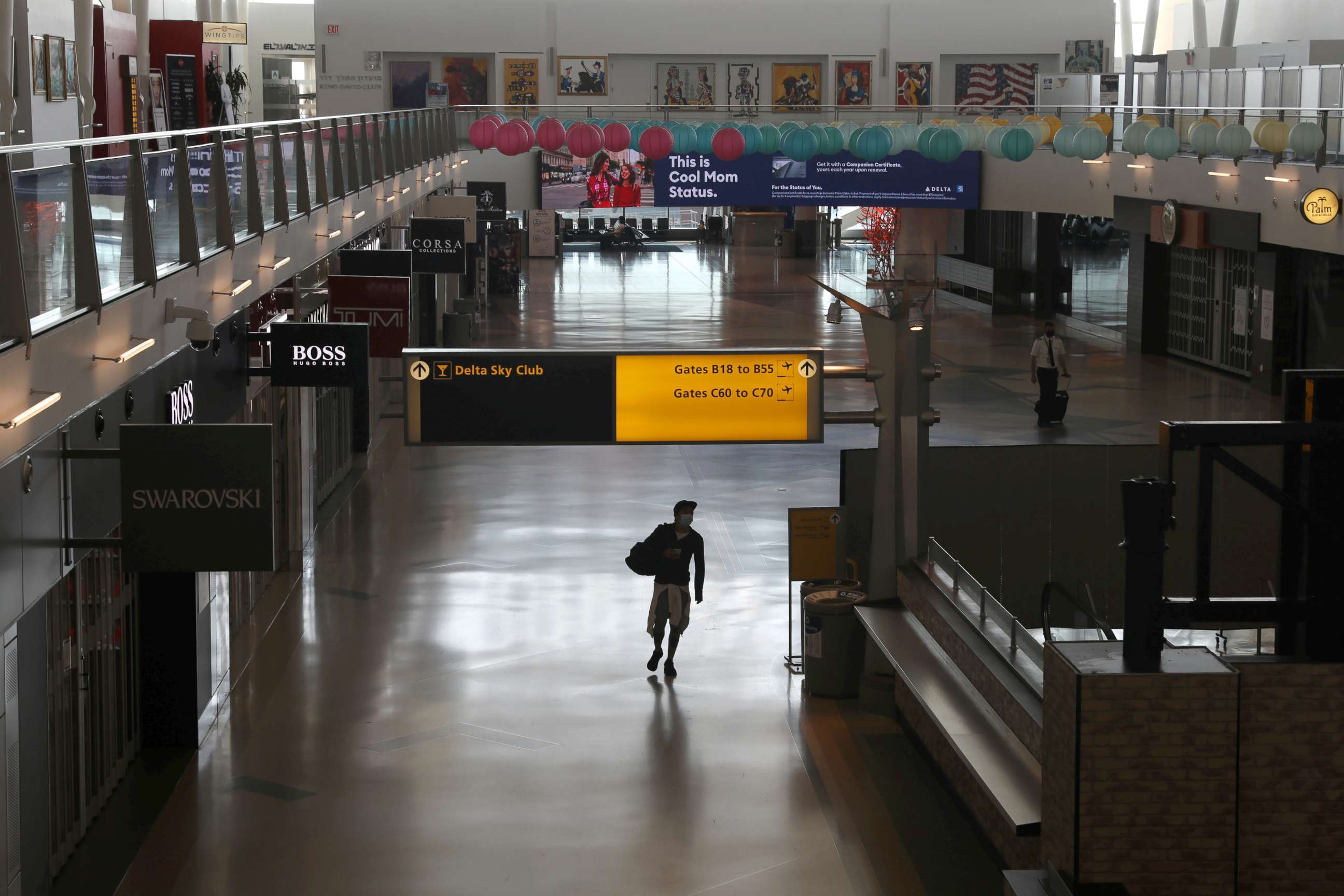
10:30 a.m.: NYC to release updated number of coronavirus-related illness in kids
New York City Mayor Bill de Blasio on Monday called attention to the new name of a COVID-19-related illness in children.
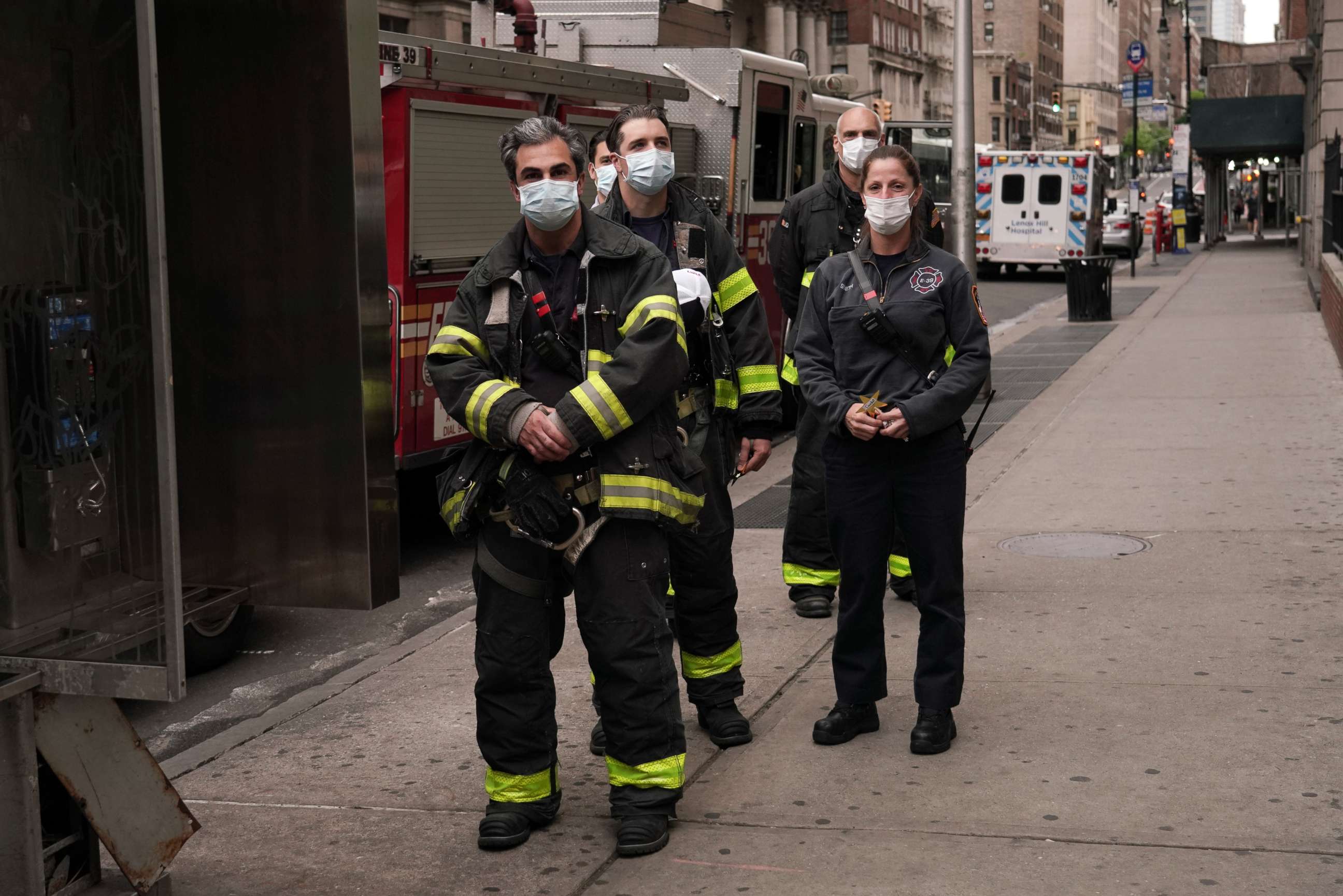
Now known as Multi-system Inflammatory Syndrome in Children (MIS-C), the Centers for Disease Control and Prevention (CDC) has confirmed that the illness does have a link to COVID-19, de Blasio said.
As of Monday, New York City has had 145 reports using the initial definition -- Pediatric Multi-system Inflammatory Syndrome. Of those cases, 67 tested positive for the coronavirus or antibodies, and one young person has died, the mayor said.
New York City officials plan to have an updated number of cases under the MIS-C definition later this week, the mayor said.
New York City's Department of Health and Mental Hygiene is reviewing reported cases under the CDC's most recent guidelines, the mayor said.
De Blasio said common symptoms include: persistent fever, irritability or sluggishness, abdominal pain, diarrhea, vomiting, rash, conjunctivitis, enlarged lymph node on one side of the neck, red cracked lips or red tongue, swollen hands and feet.
Parents should call their doctor immediately if their child has symptoms, the mayor said.
As precautionary measures, families should continue to follow good hygiene, wear face coverings and practice social distancing, the mayor said.
Overall, Monday marked a "mixed" day for New York City's three tracking progress indicators, de Blasio said.
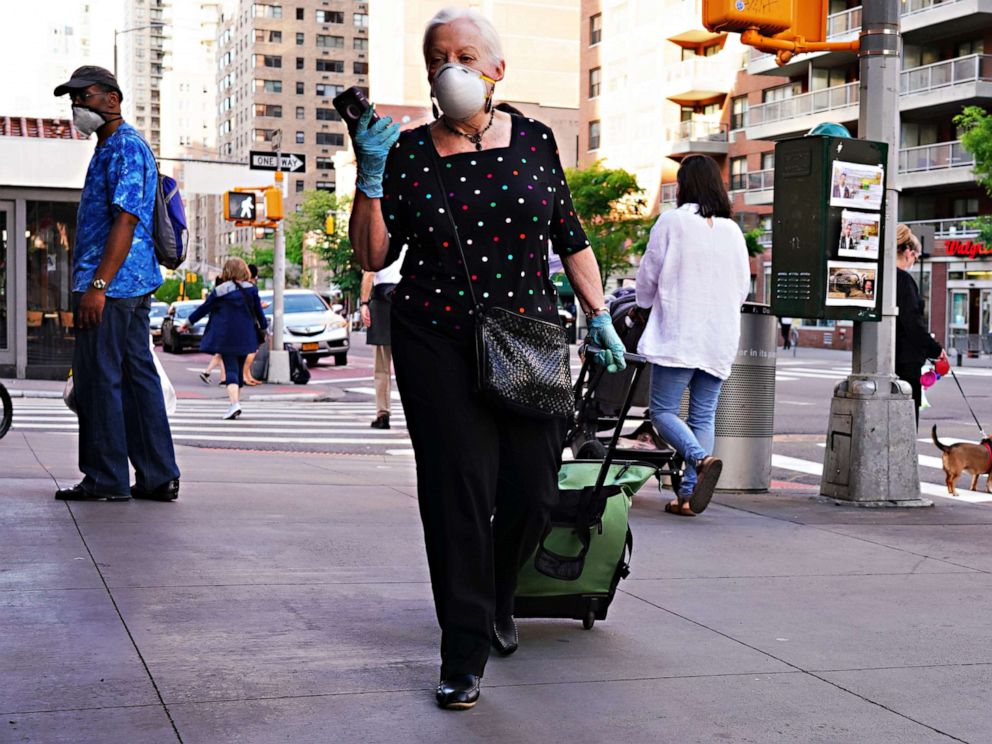
On May 16, 48 people were admitted to city hospitals for suspected COVID-19 -- down from 77 admissions on May 15.
However, there were 475 patients in city ICUs on May 16, up from 469 ICU patients on May 15.
The percentage of people tested citywide who were positive was unchanged, staying at 11% on May 15 and May 16.
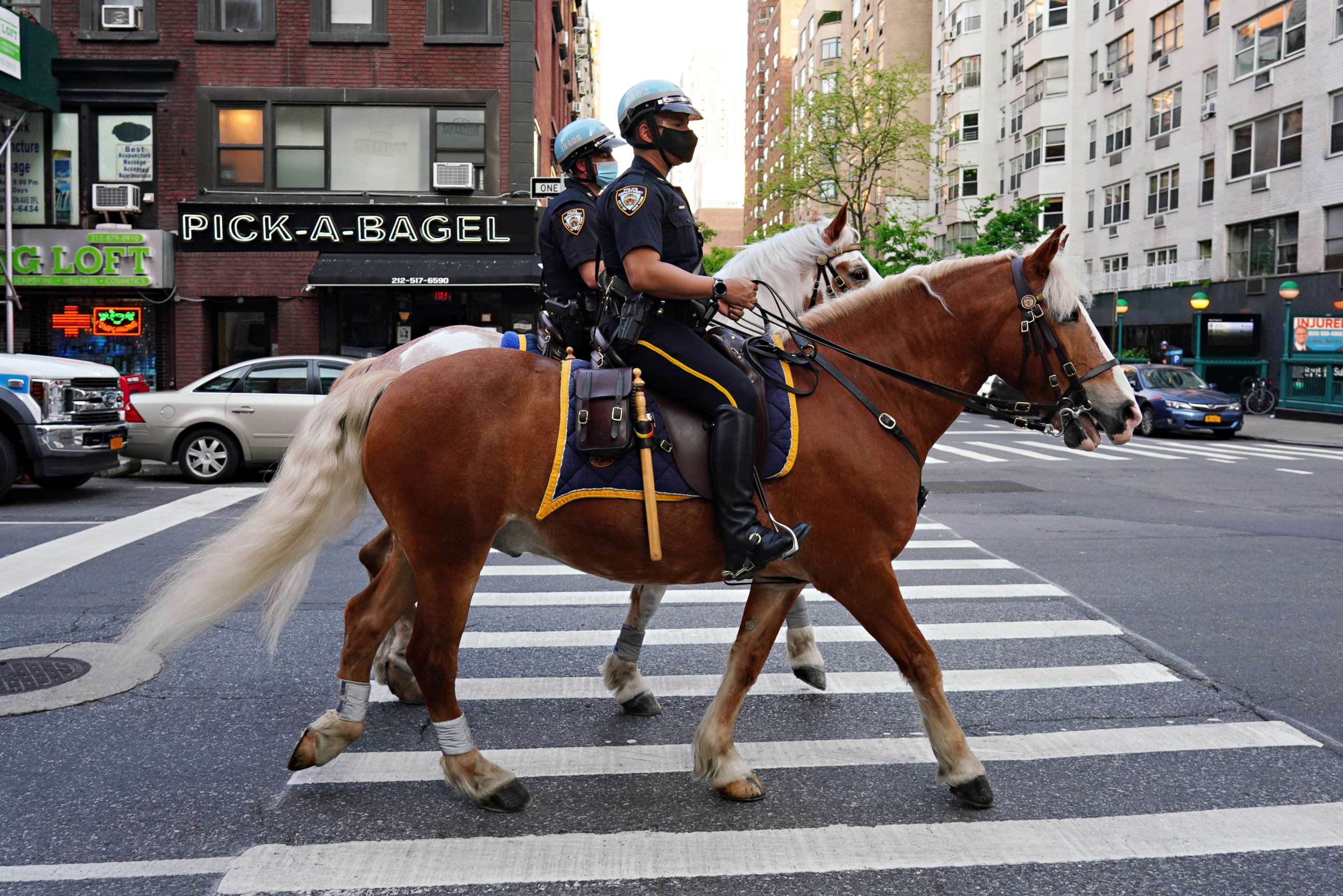
9:36 a.m.: South African president warns pandemic highlights 'dangerous and growing inequality'
South African President Cyril Ramaphosa warned on Monday that the coronavirus pandemic "has highlighted the dangerous and growing inequality that exists between countries and within them."
Ramaphosa made the remarks via video conference at the opening of the World Health Organization's 73rd World Health Assembly.
"Although the virus has affected both developed and developing countries," he said, "it is the poor who suffer the most."
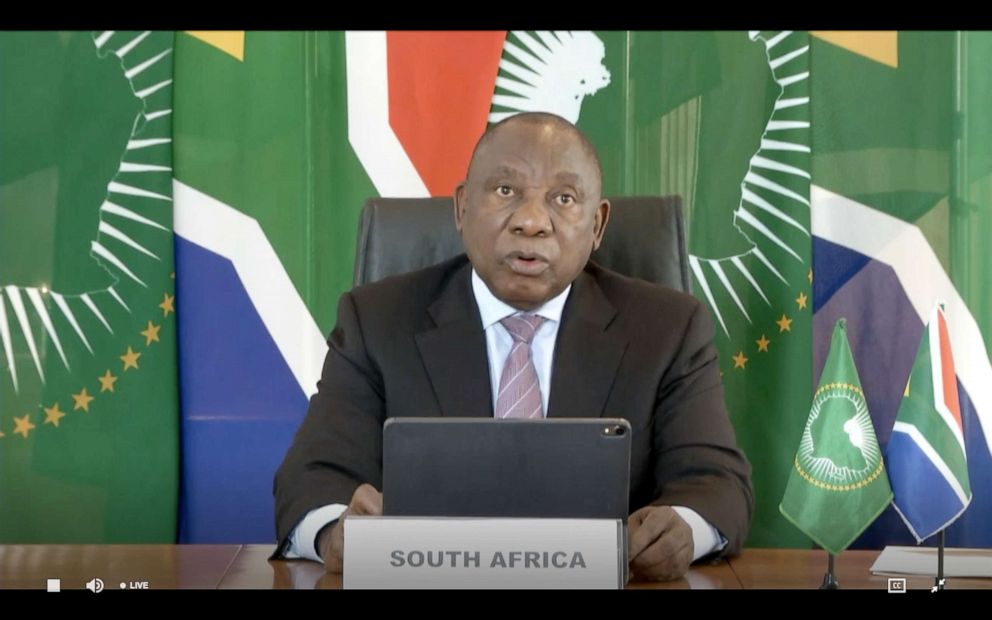
The South African president noted that health care systems of many countries "are struggling to cope."
"Some have been weakened by underfunding and neglect," he said. "Others are under pressure because they were designed to serve the select few."
Ramaphosa, who is also the current chairman of the African Union, said that Africa affirms "its full support" for the WHO, which he said "has been instrumental in providing guidance and support to African governments."
"Africa is extremely vulnerable to the ravages of this virus," he said, "and needs every possible support and assistance."
What to know about coronavirus:
- How it started and how to protect yourself: Coronavirus explained
- What to do if you have symptoms: Coronavirus symptoms
- Tracking the spread in the U.S. and worldwide: Coronavirus map
9:01 a.m.: WHO kicks off 1st virtual assembly amid calls for coronavirus probe
The World Health Organization kicked off its first virtual assembly on Monday as more than 100 of the body's 194 member nations, including the United States, now back a resolution calling for an independent probe into the origin of the coronavirus pandemic.
The draft resolution will be presented on Monday, the first day of the 73rd World Health Assembly. Although the resolution does not specifically name China, many countries have accused Beijing of withholding information about the novel coronavirus, which was first detected in the Chinese city of Wuhan back in December.
Speaking by video conference at the opening of the two-day gathering, Chinese President Xi Jinping said his country would support a "comprehensive review" into the pandemic once it "has been brought under control." Xi added that the investigation must be done in an "objective and impartial manner." He also pledged to donate $2 billion over two years to the WHO.
"All along," Xi said, "we have acted with openness, transparency and responsibility."
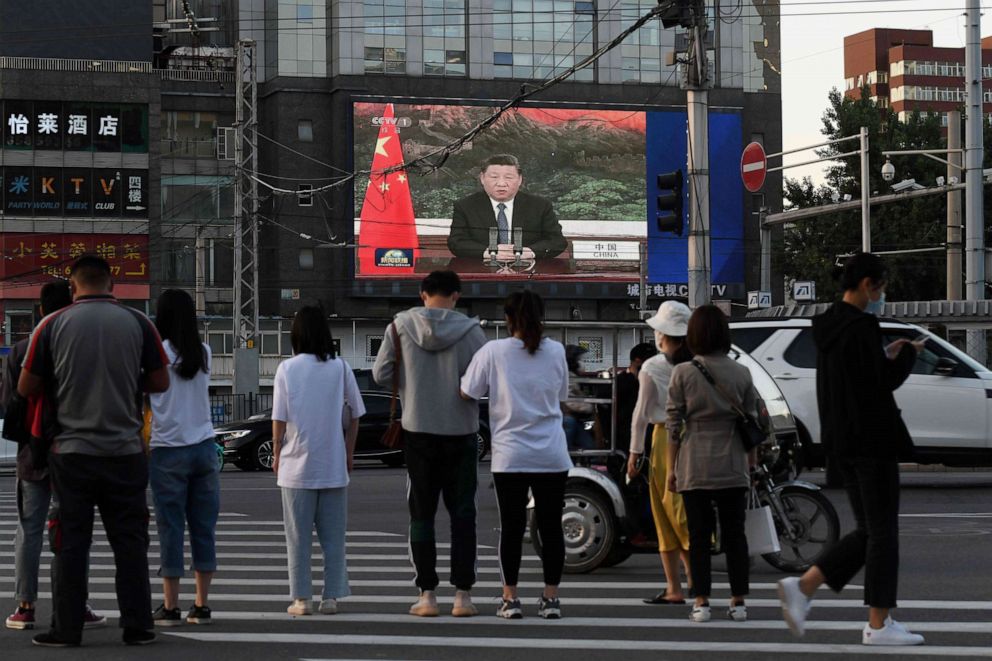
During his opening remarks, WHO Director-General Tedros Adhanom Ghebreyesus said the world has "been humbled by this very small microbe" as he urged officials to "treat this virus with the respect and attention it deserves."
"Six months ago, it would have been inconceivable to most that the world's biggest cities would fall," Tedros added. "But numbers don't even begin to tell the story of this virus. Each loss of life leaves a scar for families, communities and nations."
8:15 a.m.: Russia reports gradual declining trend in new cases
Russia reported 8,926 new cases of COVID-19 on Monday, a new low in a gradual declining trend.
The new cases confirmed over the past 24 hours bring Russia's total to 290,678, according to the country's coronavirus response headquarters. It's the lowest number of new COVID-19 cases registered in a single day since May 1, when Russia reported 7,933 new infections.
Russia has the second-largest national tally of COVID-19 cases in the world, behind the United States. The latest daily tally is down from a record 11,656 new infections on May 11. Last Thursday marked the end of a 12-day streak during which the country registered over 10,000 new cases per day.
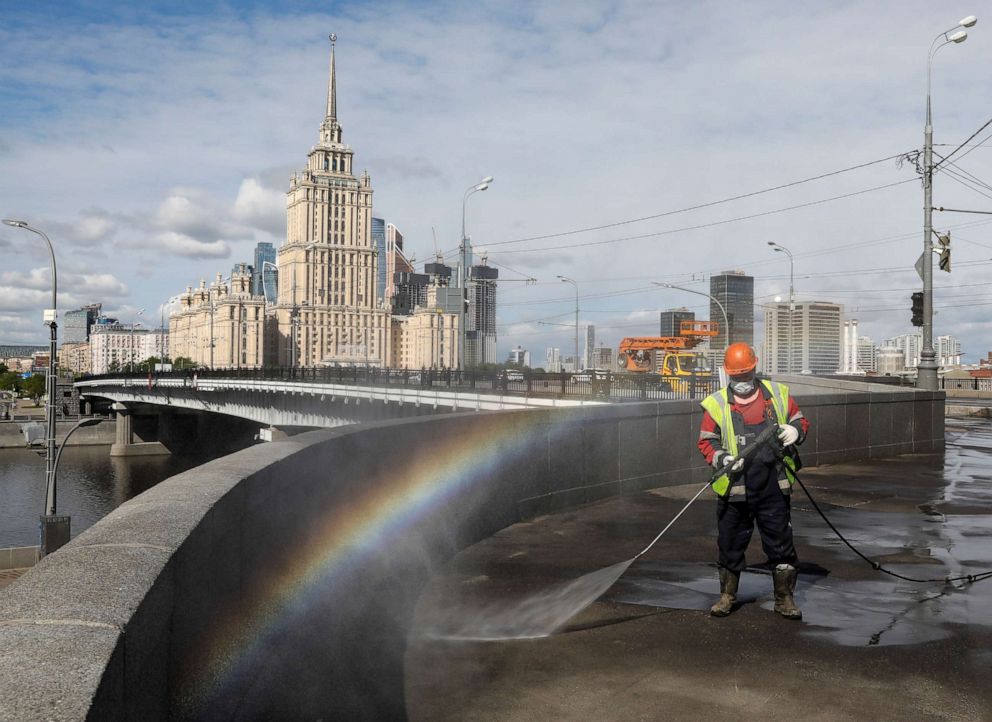
Russia also has one of the world's fastest rates of new infections in the coronavirus pandemic, second only to the U.S. However, the nation's death toll from the disease remains relatively low with just 91 new fatalities reported over the past 24 hours, bringing the nationwide total to 2,722, according to the coronavirus response headquarters.
Moscow still has the bulk of the country's infections, with 3,238 new cases registered in the capital over the past 24 hours. The city also reported 77 new deaths, a record single-day increase since the start of the pandemic.
7:38 a.m.: Moderna says experimental vaccine is 'generally safe,' creates antibodies
American biotechnology company Moderna announced Monday that its experimental vaccine for the novel coronavirus has so far shown to be "generally safe and well tolerated" in the first phase of a clinical trial.
The vaccine, mRNA-1273, was the first COVID-19 vaccine candidate to be tested on humans in a clinical trail in the United States. Interim clinical data from phase one of the study also shows that mRNA-1273 produced the same or better antibody levels in participants as convalescent plasma, a century-old technique used for treating epidemics, according to a press release from Moderna.
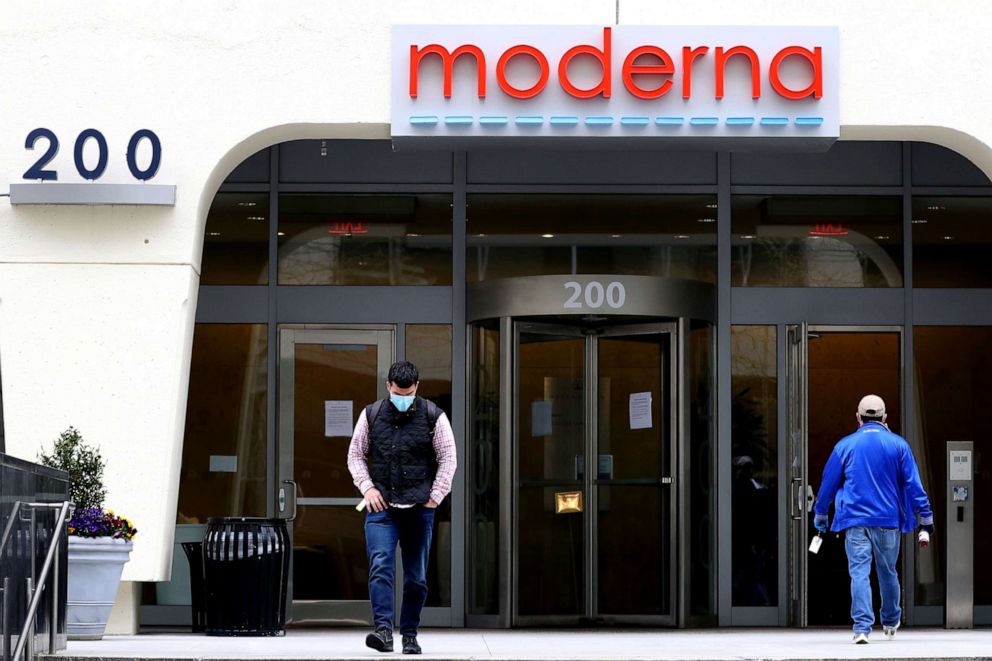
Earlier this month, Moderna announced that mRNA-127 had been cleared by the U.S. Food and Drug Administration to proceed to the next phase of a clinical trial. Phase two of the study is "expected to begin shortly," according to the press release.
The Massachusetts-based company said it is "finalizing the protocol" for phase three of the study, which is expected to begin in July.
7:16 a.m.: Ireland takes 1st steps out of lockdown
Ireland took its first steps out of lockdown on Monday, with a small range of shops allowed to reopen and people permitted to meet in small groups.
People can now go to hardware shops, garden centers, farmers' markets and other outdoor retail spaces in the country, as well as opticians, vehicle repair shops, golf courses and tennis courts. Constructions sites also resumed work Monday. Other shops remain closed, likely for at least another three weeks. Bars and restaurants are not expected to reopen until the summer.
People are urged to still only make trips to shops when it is essential, and those who can work from home must continue to do so.
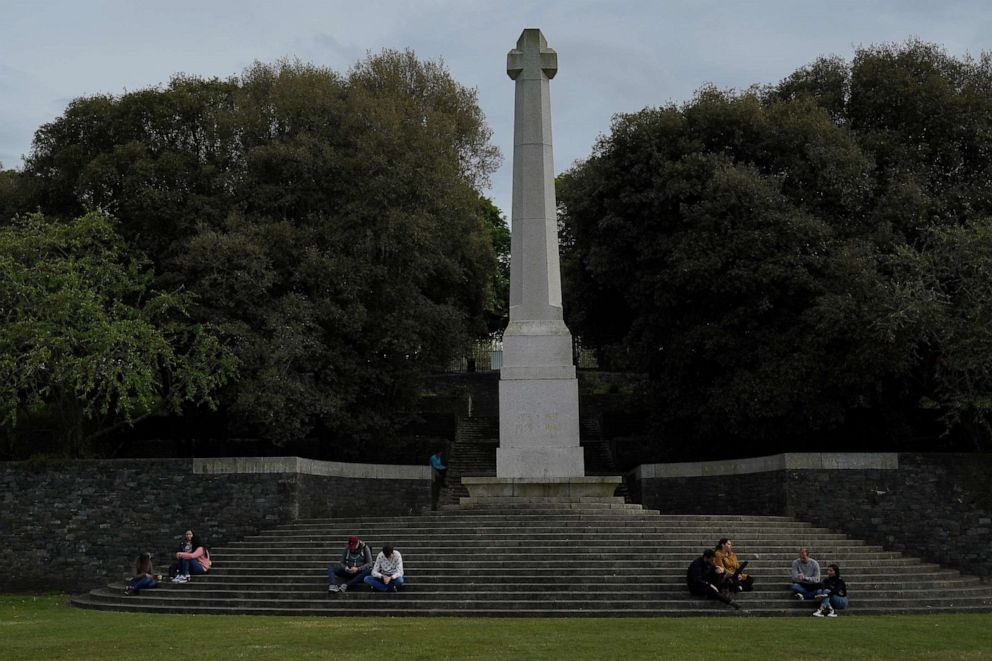
Members of the public are also allowed to meet with people outside their household starting Monday, but only in groups of no more than four and they must remain 2 meters apart. Officials have urged caution on the first day of eased restrictions, warning that the number of COVID-19 cases may rise as person-to-person contact increases.
"We all need to approach the coming days with care and caution, and to show some collective cop-on," Ireland's health minister Simon Harris said Sunday night. "We want the shops to stay open, so there's no need to rush down to your local DIY center or garden shop today."
Ireland recorded just 64 new cases of COVID-19 on Sunday -- its lowest daily increase since March 16, around the time the Irish government began imposing restrictions. In total, the country has more than 24,000 diagnosed cases with at least 1,543 deaths, according to a count kept by Johns Hopkins University.
6:34 a.m.: Vatican reopens St. Peter's Basilica as Italy returns to relative normality
Saint Peter's Basilica threw its doors open to visitors on Monday for the first time since March.
Pope Francis inaugurated the full reopening of the world-famous basilica in Vatican City and held a private morning mass in the chapel for the 100th anniversary of the birth of Pope John Paul II. The basilica was then opened to the public for masses after the pope had left.
Both Saint Peter's Square and Saint Peter's Basilica in Vatican City, an independent enclave surrounded by Rome, were closed to tourists after Italy's prime minister imposed a lockdown across the entire country on March 9 because of the coronavirus pandemic. The basilica was cleaned and sanitized last week ahead of Monday's reopening. All visitors must now wear face masks, sanitize their hands and maintain at least a 5-foot distance from others upon entering the site.
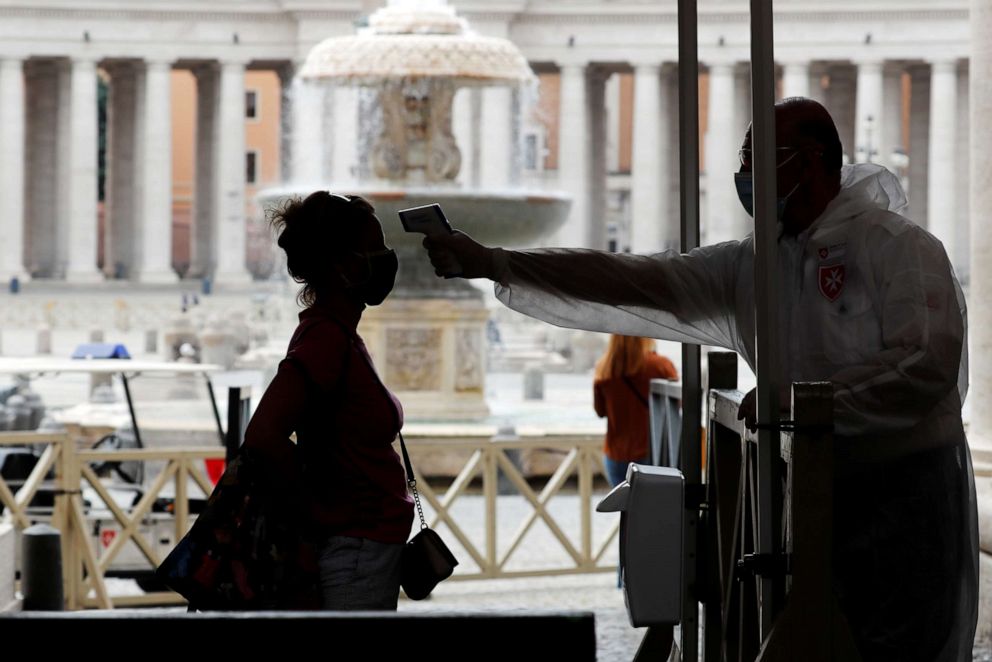
Catholic churches across Italy also held public masses for the first time in over two months as the country continues to ease coronavirus-related restrictions. Meanwhile, shops, restaurants and hair salons reopened as most businesses resumed activities Monday.
Once the worst-hit country in Europe, Italy was the first nation in the world to put a nationwide lockdown in place due to the pandemic. More than 225,000 people in Italy have been diagnosed with COVID-19 and at least 31,908 have died, according to a count kept by Johns Hopkins University.
Italy began to slowly lift the strict lockdown earlier this month. The country's economy is forecast to contract by at least 8% this year as a result of the epidemic.
5:51 a.m.: France confirms 70 new cases in reopened schools
At least 70 new cases of COVID-19 have been detected in reopened schools in France as nearly 150,000 more children returned to classrooms on Monday, according to the country's education minister Jean-Michel Blanquer.
"Every time, or almost every time, these are cases that are declared outside of school," Blanquer told French radio network RTL on Monday, adding that "it is inevitable" for there to be some cases found inside of school "but that remains the minority."
Last week, some 1.5 million elementary and primary school students -- roughly one in every four -- returned to class as France gradually emerges from a nationwide lockdown imposed to curb the spread of the novel coronavirus. Blanquer noted that 70% of all students in the country continue to take classes at home, not at school. The French government is allowing parents to keep children at home amid fears prompted by the virus outbreak.
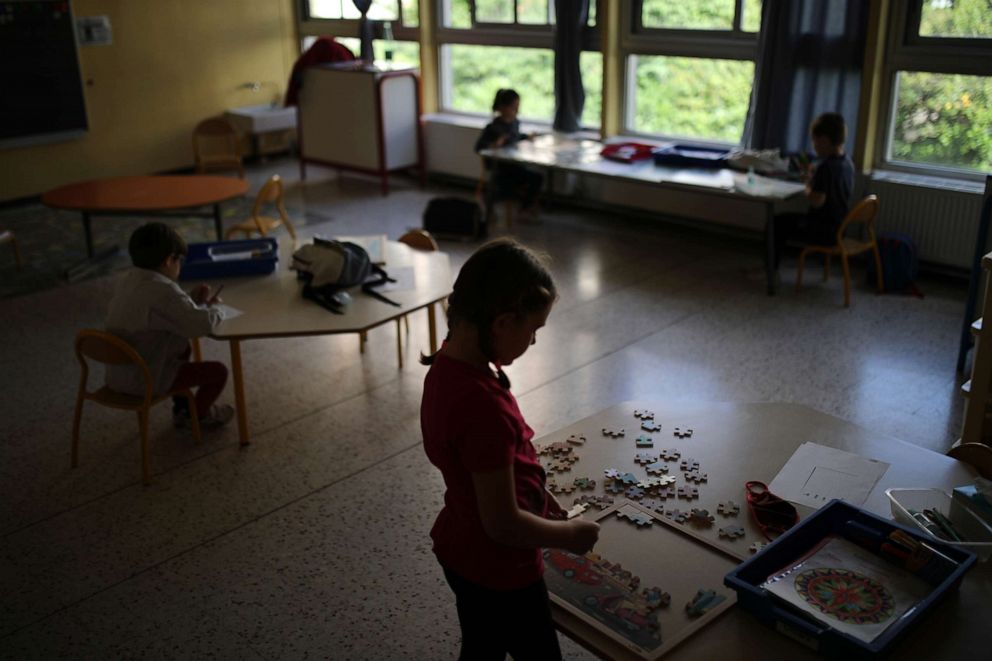
The newly-detected cases in schools come as health officials identified a number of new clusters across the country, including 34 employees who tested positive for the virus at a slaughterhouse in Fleury-les-Aubrais, a commune in the Loiret department of north-central France.
France is one of the worst-affected nations in Europe amid the coronavirus pandemic, with more than 179,000 diagnosed cases of COVID-19 and at least 28,111 deaths, according to a count kept by Johns Hopkins University.
4:57 a.m.: Wuhan nearly doubles number of COVID-19 tests per day
The Chinese city of Wuhan, ground zero of the coronavirus pandemic, conducted 222,675 nucleic acid tests on Saturday, nearly doubling from the previous day, according to the local health authority.
Last week, the Wuhan Municipal Health Commission announced a citywide campaign to test the entire population of 11 million residents for COVID-19 in an effort to search for asymptomatic carriers of the virus, after a cluster of new cases emerged for the first time since the city had lifted its strict lockdown on April 8.
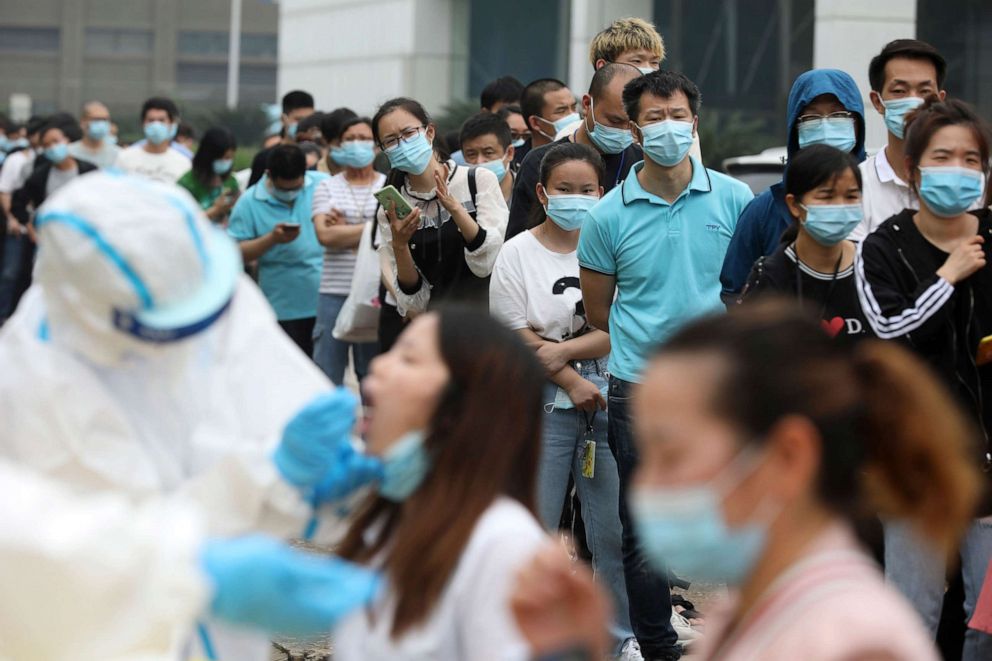
The number of tests conducted daily has increased from 113,609 last Friday and from 72,791 last Thursday. No confirmed cases of COVID-19 with symptoms were found during this testing period; however, 28 new asymptomatic carriers were identified, according to daily reports published by the Wuhan Municipal Health Commission.
Although recommended, participation in the testing campaign is voluntary. Residents who were previously tested do not need to take part. It is not recommended to test children under the age of 6, according to the Wuhan Municipal Health Commission's website.
3:40 a.m.: 13 sailors test positive again after returning to virus-hit USS Theodore Roosevelt
At least 13 U.S. Navy sailors who were previously asymptomatic with COVID-19 have tested positive again after returning to the USS Theodore Roosevelt, a defense official told ABC News.
Navy officials aren't sure what's going on as the sailors had all cleared the protocols to reboard the coronavirus-stricken ship -- completing a 14-day quarantine and testing negative for the virus twice over the following four days. The sailors weren't working together so it appears they didn't infect each other aboard the ship, according to the defense official.
It's possible the tests are picking up remnants of the novel coronavirus in the sailors. But after being asymptomatic for almost three weeks, all 13 sailors are experiencing mild body aches and headaches. Those symptoms led to tests that showed they were all positive for COVID-19 a second time, the defense official said.
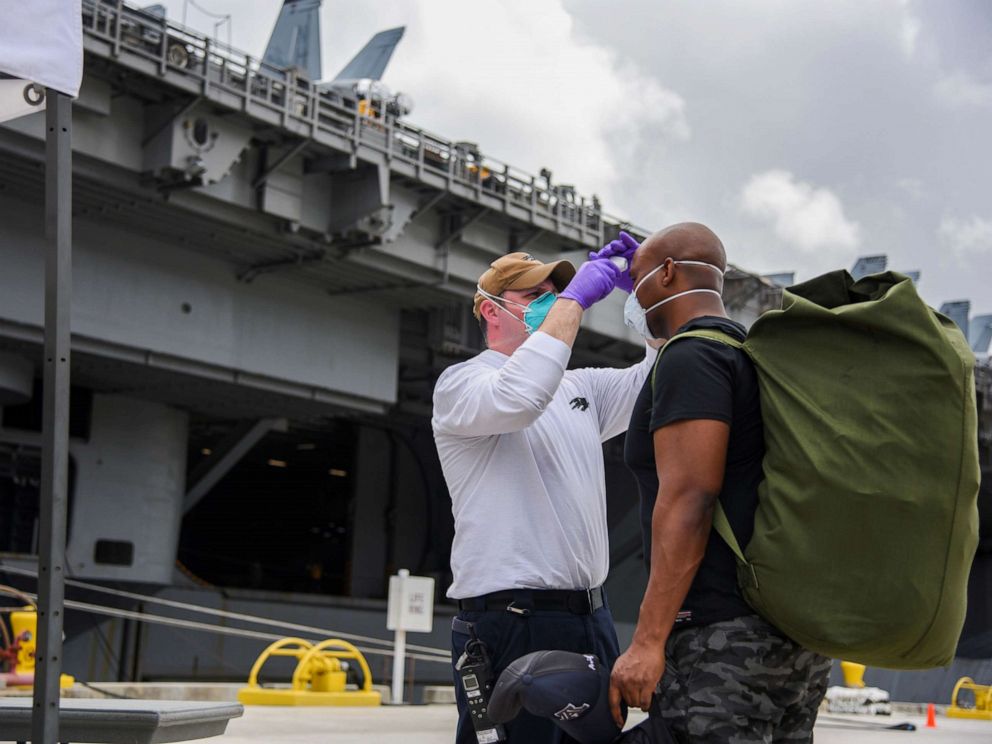
When the first sailor described having the body aches and headaches, Navy medical teams urged previously positive and asymptomatic sailors to step forward if they were experiencing the same symptoms. Those who said they had the symptoms all tested positive for the virus again, according to the defense official.
The mystery comes as more than 2,900 sailors have returned to the USS Theodore Roosevelt to prepare for its eventual departure from Guam. The 97,000-ton aircraft carrier was forced to dock at the strategic naval base on the U.S. island territory on March 27 due to a COVID-19 outbreak among the roughly 5,000 crew members.
At least 940 sailors had tested positive and were immediately placed in isolation while the more than 4,000 who tested negative were quarantined in hotels and other facilities ashore. Some 700 sailors remained on board to deep clean the ship and run essential services before beginning their isolation period as crew members who were deemed virus-free took over, according to a press release in late April from the U.S. 7th Fleet.
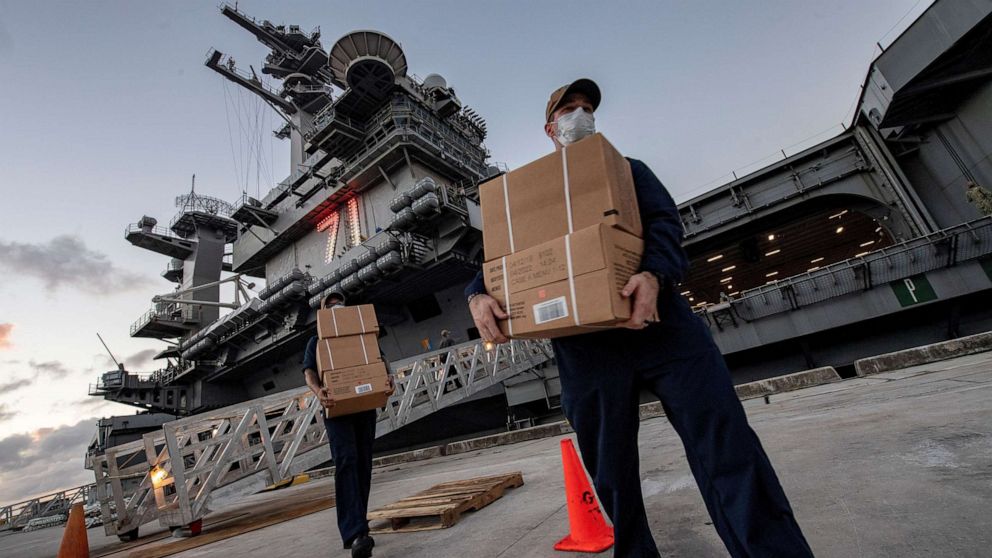
The Navy announced on Sunday night that the USS Theodore Roosevelt will now begin a "fast cruise" pier-side in Guam to simulate the ship's operations at sea ahead of its departure, which appears to be imminent.
Another defense official had told ABC News last week that one plan under consideration is to set sail without the full crew on board while still having the right number for all of the essential tasks.
"After safely completing fast cruise, Theodore Roosevelt and its crew will be one step closer to going to sea to conduct carrier qualification flights for Carrier Air Wing 11," the 7th Fleet said in a press release on Sunday. "The remainder of the crew will return to the ship following the air wing integration."
ABC News' Gio Benitez, Dee Carden, Ibtissem Guenfoud, Mina Kaji, Aaron Katersky, Alina Lobzina, Luis Martinez, Arielle Mitropoulos, Phoebe Natanson, Patrick Reevell and Eric Strauss contributed to this report.
